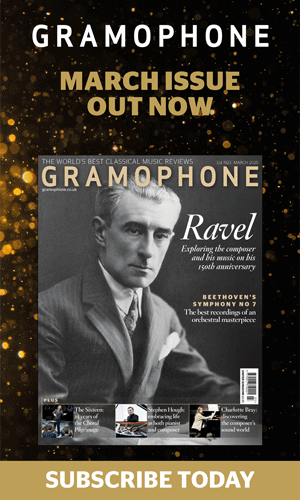Top 10 Recordings for Revising: Choral Edition
Theo Elwell
Wednesday, May 8, 2024
With exam season well under way, we've compiled 10 recordings that will help you on your revision journey


At Choir & Organ, we remember just how stressful exam season can be, especially when you have to keep up your practice or rehearsal routine at the same time. We've compiled a selection of recordings with think will help with your studies and hopefully give you many hours of listening pleasure.
If you are interested in reading the best classical music reviews and discovering great new recordings every month then do consider subscribing the Gramophone, we'd love you to join us. Explore our subscription offers here: magsubscriptions.com
Elgar - Lux æterna (Voces8)
John Cameron arranged this beautiful rendition of Elgar’s ‘Nimrod’ from the composer’s Enigma Variations. Originally composed for orchestra between 1898 and 1899, the Enigma Variations is a work of 14 variations based on the original ‘Nimrod’ theme. Sung by VOCES8, this emotionally stirring arrangement is a perfect accompaniment to your exam revision.
Tallis - If Ye Love Me (The Kings Singers)
Taken from their album ‘In Isolation’, a collection of tracks recorded from the singers’ homes during the Covid lockdown, If ye love me by Thomas Tallis is a homophonic motet, meaning one syllable is sung per chord which allows for a calming listening experience. The piece has strong ties with the royal family and was sung both at the wedding of the Duke and Duchess of Sussex and the funeral of Prince Philip.
James Bassi - Quem Pastores Laudavere (Ora Singers)
Despite being featured on Pro Organo’s ‘Christmas on Fifth Avenue’ album, we think Bassi’s Quem Pastores Laudavere can be enjoyed all year around. Beginning with beautiful flowing homophonic lines, the piece opens up into the name of the piece, translating from Latin as ‘He whom the shepherds praised’ and is peppered with luscious suspensions. This is a sure favourite for any fans of Chilcott and Rutter.
Chilcott - O Emmanuel (Junger Kammerchor Rhein-Neckar)
Bob Chilcott’s magical and haunting sonic landscape is one to get lost in. A short work, at only 1’34”, this piece for double choir is sung by the Junge Kammerchor Rhein-Neckar, founded in 2001 by Mathias Rickert and is evocative of atmospheric and dreamlike film scores.
Stanford - 8 Part-Songs, Op.119: No.3, The Blue Bird (Tenebrae)
Charles Villiers Stanford’s The Blue Bird is set to the words of a poem by the same name, penned by author Mary Elizabeth Coleridge. A slow-moving and calming piece, it describes a peaceful setting in its text:
“The lake lay blue below the hill.
O'er it, as I looked, there flew
Across the waters, cold and still,
A bird whose wings were palest blue.
The sky above was blue at last,
The sky beneath me blue in blue.
A moment, ere the bird had passed,
It caught his image as he flew.”
Stopford - Lully Lulla Lullay (VOCES8)
Based on the original Coventry Carol, dating from the 16th century, Philip Stopford’s Lully Lulla Lullay is a lullaby and tells the story of a mother rocking her baby to sleep. Packed full of emotional swells, this one is a tearjerker. Sensitively sung by VOCES8.
Rosano - Requiem (Andreas Scholl)
Written for two countertenors, choir, organ and strings. Rosano’s Requiem was born out of collaboration with Andreas Scholl and features text from the Latin mass. Hailing from Italy, Marco Rosano is predominantly known for his film scores and has displayed his compositional prowess with this haunting requiem.
Byrd - Four Part Mass: Kyrie (Choir of New College, Oxford)
Byrd’s Four Part Mass is often sung as part of sung eucharists in religious buildings and was sung at the coronation of Charles III and Camilla. The Kyrie is the opening of the mass and translates to ‘Lord have mercy’. Its melismatic interwoven lines offer a never-ending tapestry to revise to.
Gesualdo - Illumina faciem tuam (Oxford Camerata)
Illumina faciem tuam translating as ‘Make thy face to shine’ is the setting of Carlo Gesualdo’s motet. Sung in this recording by the Oxford Camerata, the piece features expressive word-painting and growing tension as the the ensemble sings ‘salvum me’ (‘save me’) and ‘quoniam invocavi te’ (‘for I have called upon thee’).
Purcell - Thou knowest, Lord, the secret of our hearts, Z.58 (The Cambridge Singers)
Henry Purcell’s Thou knowest, Lord, the secret of our hearts is an emotional journey of highs and lows. Beginning tenderly with comforting perfect cadences, the piece climaxes as The Cambridge Singers sing the words ‘Oh God!’, (something every revising student has shouted…) before resolving with a positive tierce de picardie.
Never miss an issue of the world's leading classical music magazine – subscribe to Gramophone today







